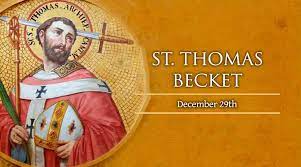Thomas was born in 1118, the son of Gilbert and Mathilda, ambassadors to London. He was educated at the age of twenty-four, he held a high office in the house of Theobald, Metropolitan of Canterbury. The young man, who was notable for his extraordinary ideals and intellect, quickly won the favor of the metropolitan. With the consent of the Metropolitan, he undertook theological studies along with his work.
In 1154 he has ordained deacon and later Archdeacon of Canterbury. In 1155, at the age of thirty-six, he was appointed Chancellor by King Henry II.
Theobald, Metropolitan of Canterbury, died in 1161. Henry II appointed Thomas Beckett himself, who was well suited to decorate the position. Disillusioned with this decision, Thomas was later forced to accept the position of metropolitan on the instructions of Rome. In 1162 he has ordained a priest and later a bishop. From that time onwards he maintained a special warmth in his lifestyle. Spirituality was given top priority in all activities, avoiding luxuries as much as possible.
Soon the king began to interfere unnecessarily in the affairs of the church and to usurp the rights of the church. Even from Canterbury, he did not hesitate to extort the vows of the faithful. This was opposed by the Metropolitan. As a result, he was branded a traitor. He eventually left England and went to France. He was warmly received by King Louis VII of France. Accordingly, Henry II confiscated the property of the Metropolitan; All the relatives were deported.
In 1170, Thomas Beckett returned to England as a result of a temporary settlement. The King asked the Metropolitan to unconditionally avoid the punishment of the bishops who had joined the King. However, the metropolitan did not comply. At the king’s command, the soldiers forcibly dragged him from his seat and beheaded him.
The body of the Metropolitan lay orphaned in his own cathedral. People were afraid to approach the corpse for fear of the king’s wrath. Gradually the news of that tragedy spread like wildfire everywhere. After a long time, many people, including priests regained their composure and gathered in the diocesan church and respectfully buried the body of their pastor in Canterbury. Three years later, Thomas Beckett was canonized.



